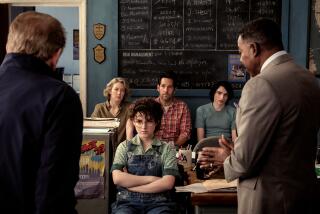Review: In ‘The Skeleton Twins,’ untangling the past to move forward
One song kept playing through my mind as I watched “The Skeleton Twins,” an introspective indie drama starring the very exciting post-”Saturday Night Live” Kristen Wiig and Bill Hader as siblings damaged by their father’s death.
“Suicide Is Painless,” the Johnny Mandel classic that was “MASH’s” indelible and ironic musical anchor, is very much the sensibility that director Craig Johnson confers on his film — emotionally authentic, atypical in the way it looks at suicide and its ripple effects.
“It brings on many changes ... .”
Deftly weaving humor and sweetness in with the pathos, Johnson and Mark Heyman’s screenplay won the coveted Waldo Salt screenwriting award at the Sundance Film Festival in January.
But it is what Hader and Wiig do with the words that make this one of the better movies to come along this year. The pair, who specialized in over-the-top nonsense on “SNL,” till the terrifying terrain of adults who lost their father to suicide when they were young with such eloquent grace that it speaks volumes about the depth of their talent.
It would be a loss if comedy were to lose them entirely, and from the look of their future commitments there is nothing to fear, but “The Skeleton Twins” makes you glad they’re taking on life’s weightier issues too.
For Johnson, it’s an impressive step up from his first feature, “True Adolescents” (2009), which caught the filmmaker, as well as the movie’s main character, played by Mark Duplass, still in the midst of finding himself.
“Skeleton Twins” is all grown up, though Maggie (Wiig) and Milo (Hader) are definitely cases of arrested development, their emotional growth stunted by Dad’s death in vastly different ways.
As the film opens, they are both contemplating their own methods of acting out that lethal legacy. It’s a provocative way to establish the point that the twins have been floundering in life for a long time. Milo comes closer to succeeding at ending it all. His inability to cope with his downward spiral as a failing actor in Los Angeles puts him in the hospital. The call from the nurse means the handful of pills Maggie has will go back in the bottle for now.
The crisis serves to reconnect them after a decades-long estrangement.
Maggie’s invitation for Milo to come live with her for a while sets in motion the film’s examination of the complexities of siblings’ affection for and disaffection with each other. This is as central to the film as the idea of suicide. Wiig’s ability to let sorrow settle into her eyes and, like a tear, just hang there, gets a workout here. Hader’s gift of mood-shifting, flipping through emotions like pages of a book he barely finds interesting, carries one scene after another.
“Twins” is serious about its subject. Yet Hader’s truly inspired lip-sync of Starship’s “Nothing’s Gonna Stop Us Now” is funny without being frivolous. The twins grew up in the 1980s, and the music from that time frames their lives.
The fact that Maggie still lives in their hometown, somewhere in the bucolic Hudson Valley, is not accidental either, and wonderfully shot by director of photography Reed Morano, by the way. The subtext is that they must untangle the past before they can move forward.
Milo is gay, but like everything else about the film, the way it factors in is unexpected. There are flashbacks that show Milo and Maggie playing dressup as children. The way she carefully applies lipstick on her dress-wearing brother suggests acceptance by the family wasn’t among his issues. Milo’s stop by the local bookshop owned by his former English teacher Rich (Ty Burrell) begins to give us the shape and source of his pain.
Maggie’s married to an easygoing former jock, Lance (Luke Wilson). He’s sweet, uncomplicated, thinks they’re trying for kids, while the birth-control pills are hidden in a drawer and Maggie’s getting in over her head with her hunky scuba-diving instructor Billy (Boyd Holbrook).
On one level, Maggie and Milo keep circling around the idea that perhaps, like their dad, it would just be easier to end it all rather than deal with the difficulties of reality. But on another level, they are as engaged in figuring out if — and how — they can repair their damaged relationship.
Twins are bound more tightly than most siblings, and time and again Johnson uses that bond to break down the idea of living versus not, loving versus not. The question is whether, like the Mandel song, Milo and Maggie can “take or leave” suicide as they please. “The Skeleton Twins” answers it beautifully.
------------
‘The Skeleton Twins’
MPAA rating: R for language, some sexuality and drug use
Running time: 1 hour, 32 minutes
Playing: ArcLight, Hollywood and Pasadena; Landmark Theatres, West Los Angeles
More to Read
Only good movies
Get the Indie Focus newsletter, Mark Olsen's weekly guide to the world of cinema.
You may occasionally receive promotional content from the Los Angeles Times.







